Garvin Jabusch
Let’s be clear: Justice is not an immutable law of nature. Neither math nor physics nor chemistry recognizes justice as one of the universe’s governing principles. The strong, rich, and powerful have, since long before humans emerged, by and large taken what they wanted, when they wanted, and never counted the costs to those they took it from. Despite what Socrates may have said, justice has forever occurred, at best, in fleeting, ephemeral flashes. We yearn for a god capable of seeing and ultimately judging all rights and wrongs because we know we can’t be counted on to do it ourselves. Small wonder that the legend of Robin Hood – the original 99 percenter still resonates after 800 years.
Image courtesy Zach Weinersmith and SMBC
We can say that humanity might change, but that’s just another, kinder, more optimistic lie. We can’t. Not as a whole, not within the time scales required to preserve ourselves. We are descended, on a time frame of 3.5 billion years, from organisms that succeeded because they were the best at gathering as much as they could in the shortest amount of time possible. This has been true throughout history. And prehistory. And primordial history. It’s too deeply ingrained to switch off or even ignore. We just don’t work that way, and it’s time for us to accept that and start thinking about how to address our problems without relying on an ultimate goodness in our nature.
So, what, then? How can we approach our main challenges? How can we arrive at the sustainable, circular, next economy and learn to live within the various budgets that earth can provide?
In concept, it’s simple: Align people’s economic interests and sense of well-being with the best interests of Earth’s ecological totality. Call it next-economy capitalism.
In practice, that’s insanely difficult.
It’s difficult, because, again, maximizing short-term profit while ignoring larger costs is humanity’s prevailing worldview, and extracting fossil fuels (especially when subsidized) is a fantastic way to earn short-term profits. Consequently, the phalanx of opponents of renewable energy and electric transportation is impressive and daunting. It’s the list of industries that stand to lose market share and profits as renewables advance: oil, coal, gas, traditional electric utilities, and makers of internal-combustion cars.
Given this opposition, rather than lament the slow adoption of renewables and electric vehicles, we should be proud and even amazed that we have made as much progress as we have. That’s a testament, really, to two things: the tireless efforts of all those working for change and, more importantly, the fact that ultimately renewables just make better economic sense. No matter how much disinformation gets thrown at people, there’s no escaping the fact that technologies with a zero cost of fuel will inevitably become cheaper than any extractive industry of the same or even somewhat larger scale, even, ultimately, natural gas.
But there’s the rub, renewables are still such a tiny fraction of the size of fossil fuel industries that their true potential does not yet shine brightly in the popular imagination. And when we do see hints that this tide is turning, tactics are swiftly deployed to keep the status quo intact. Is it coincidence that large tariffs are being placed on the world’s least-expensive solar modules just as those modules reach cost parity with coal on the U.S. electric grid (see “Why We Pay Double for Solar in America (But Won’t Forever)“)? Or that in North Carolina “sea level rise” is pilloried as a “liberal buzzword?” Facts of science are not buzzwords. Forbidding developers from planning for accelerated sea level rise will not protect low-lying communities from storms, nor force insurance companies to cover them. Placing authoritarianism (“because I said so” laws) above science and empiricism will simply not work. Folks who plan for sea level rise are outlaws now? Please.
Given the power of our fossil fuels oligarchs, it seems like change toward sustainability faces long odds. Who can doubt the power of the oil plutocrats when there are still huge subsidies for fossil fuels (the most profitable industry in history), while renewables (which are actually still in the “kick start” phase that subsidies are meant to support) get relative pennies. When the temporary denial of the KXL pipeline to cross the U.S.-Canada border quiets critics, while construction both north and south of the border legs continues unabated. (On this point let’s not forget that the last major tar sands pipeline spill cleanup is still underway and costing $800 million.) When there are already over 680,000 deep-injection wells that have pushed more than 30 trillion gallons of toxic liquid into U.S. ground, and yet there is scarce examination from policy makers? When the U.S. supported the obviously nondemocratic coup in the Maldives against a popular, democratically elected president, Mohamed Nasheed, who happened to be a tireless worker to limit fossil fuels where possible. Nasheed, who was crusading to limit global warming to such an extent that he held a symbolic cabinet meeting underwater, was illegally removed from office with rhetorical support from U.S. officials.
I think it’s naïve to blame this or that administration for our refusal to slow the growth of our carbon emissions, when it’s clear that in certain areas, oil executives have as much or more influence as the executive and legislative branches combined. They’re the richest organizations in all of human history, so that’s simply where power resides.
And one assumes big oil will have seen the writing on the wall of the future by now, and be plotting ways to become the masters of the next great sources of energy. I hope that’s the case, but other than Total buying a big piece of Sun Power, I’ve seen no major moves in that direction. In fact, as recently as October 2011, I heard an oil executive at a conference say something very like “yeah, we tried experimenting with solar in the ’70s, but it was just way too expensive to make a decent value proposition,” as though he thought the audience was credulous and uninformed enough not to know PV efficiency has improved more than 100 times per dollar’s worth since then.
So leaving global warming, pollution, disease, resource scarcity, and war aside, the argument we can win is going to be economic: The best renewables are a better value proposition. At least on a level playing field. The race is, even after we’ve come all this way, to prove that we still have even small reasons for long-term optimism that we can credibly make this case.
And, fortunately, we do. For as surely as humans are programmed to maximize short-term gains, we’re also fantastic innovators, and we may have a greater capacity for adaptation than any other species. And this is where the most rational of empiricists, who only believe in what they can observe, can place some modicum of faith. Because when it comes down to adapt or fail, we will take a big swing at adapting. And, being much better at adaptation than some of earth’s former dominant species, e.g. dinosaurs, we have a far better chance of success.
It’s now clear that unrestrained burning of fossil fuels is backing us into an existential corner. Therefore, we will hopefully try to adapt by limiting fossil fuels’ use where we reasonably can. (The struggle between short-term individual gain and larger picture group selection that ultimately benefits individuals as well was recently discussed in an editorial by E.O. Wilson, who argued that we’re the products of both types of evolutionary pressures, and that we apply whichever is most appropriate to given circumstances. For what it’s worth, I believe that the primary ideological divisions in this country are straightforward manifestations of Wilson’s approach to this “multi-level natural selection,” and that evolution proves that we need both.)
So to tie our remarkable capacities for innovation and adaptation to our economic and social well-being is clearly now, as it has always been, the way forward. Plus ca change… Most directly, we need to accelerate investments into the best, most profitable, most effective renewables, water solutions, agricultural solutions, and all other sustainable manifestations of technologies required to run an economy. And we need to invest in them until it becomes so obvious that they’re the most efficient multipliers of human effort that all ideological considerations fall by the wayside, the way oil replaced coal, the way coal replaced water wheels. We know how to be better, more innovative, and smarter at accumulating profits and wealth. As computer science pioneer Alan Kay put it, “the best way to predict the future is to create it.”
Garvin Jabusch is cofounder and chief investment officer of Green Alpha ® Advisors, and is co-manager of the Green Alpha ® Next Economy Index, or GANEX and the Sierra Club Green Alpha Portfolio. He also authors the blog “Green Alpha’s Next Economy.”

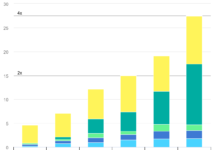
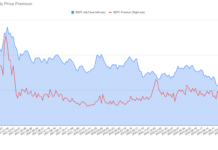
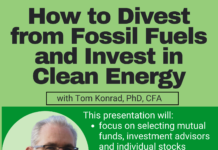
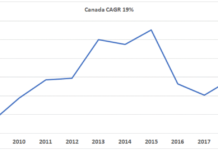
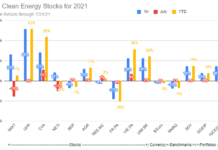
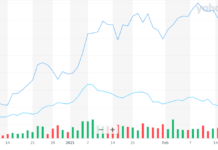


Especially to GimmeCrats and other OPM addicts.